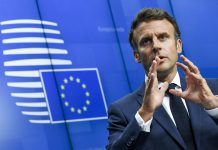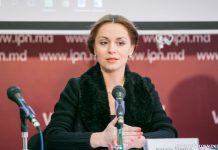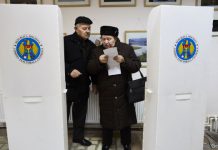Moldovan President Vladimir Voronin said on Tuesday that he might soon meet his Russian counterpart Dmitri Medvedev to talk about the Transnistrian problem. The president made the announcement during a video-conference with journalists in Chisinau and Moscow.
According to the BASA-press news agency, Mr. Voronin stated that „there is an agreement with Russian President Dmitri Medvedev to have a meeting during which we will discuss the resolution of the Transnistrian conflict” and „I believe this meeting will take place soon.”
In the same context, Voronin said that the Russian Federation has recognized Moldova’s territorial integrity.
„I am very optimistic about the resolution of the Transnistrian problem. /…/ There are positive reactions to our project regarding the status of a Transnistrian autonomy from our negotiation partners, with the exceptions of Russia and Transnistria,” added Mr. Voronin.
Referring to the Voronin-Medvedev meeting, Foreign Affairs Minister Andrei Stratan told journalists on Tuesday that „we do not intend to negotiate on a one-plus-one or a one-plus-two basis. We will salute the consent of the parties so that we can have consultations about the problems of solving the Transnistrian conflict. /…/ It is very important to maintain this dialogue (Imedia: with Russia) so that we are not blamed that Moldova is intentionally blocking the resumption of the five-plus-two negotiations because of its reluctance to meet someone.”
Mr. Stratan added that „we have encouraged and continue to encourage the international community to turn this subject into a permanent theme during meetings between the European Union and of the Russian Federation, as well between Russia and the United States of America, so that we can begin moving and meet in the five-plus-two format.”
According to Minister Stratan, the topic of resumption of negotiations in a 5+2 format „will be included in the discussion agenda with Russian Foreign Affairs Minister Sergei Lavrov, who accepted the invitation to visit Moldova /…/ between February 23 and 24.”
Commentary
Grigori Valovoi: The only thing we can expect is a more dynamic dialogue between Chisinau and Moscow
Grigori Valovoi, a political commentator and editor of Transnistria-based Novaia Gazeta believes that „the only thing we can expect until after the parliamentary elections in Moldova is a more dynamic dialogue between authorities in Chisinau and Moscow.”
„As long as there is no certainty with regards to the future make-up of power in Chisinau, it is improbable that one of the parties in the negotiation will accept a final resolution of the conflict. More likely than not, all sorts of documents will be signed. But these have to be elaborated by expert groups that are not currently functional. Although I do not think there are perspectives for the resolution of the Transnistrian problem in the next few months, life has taught us that there are unpredictable situations like the events surrounding the Kozak memorandum,” adds Valovoi.
The commentator suggests that „a quick resolution of the Transnistrian problem would be possible if presidents Voronin and Medvedev found a compromise, which is improbable.”
Petru Bogatu: Vladimir Voronin’s statements have an electoral purpose
Political commentator Petru Bogatu, and editorialist with Chisinau-based Jurnal de Chisinau, argues that „Vladimir Voronin’s statements have a clear electoral purpose and we must not be under the illusion that the Transnistrian problem will be resolved in the near future.”
„Once the Party of Communists enters the electoral campaign, promises like this one will appear. President Voronin who had made extremely generous promises about the resolution of the Transnistrian problem in 2008, cannot give up on them now and pretend like nothing happened. At the same time, the situation has not changed in Moscow and Russia does not intend to voluntarily give up on Transnistria, like Chisinau wants it to,” adds Mr. Bogatu.
Eugen Revenco: A meeting between Vladimir Voronin and Dmitri Medvedev could steer more pro-Russian votes toward the Party of Communists
Political analyst Eugen Revenco, from the Foreign Policy Association, says that „elections are nearing and in this context President Voronin’s statements about the Transnistrian problem can only be seen in a positive light” by the Communists.
Mr. Revenco suggests that a meeting between Vladimir Voronin and Dmitri Medvedev could bring more votes to the Party of Communists from the pro-Russian electorate, but „this meeting will mostly be a facade.”
„It is improbable that the meeting will cover crucial problems like the withdrawal of Russian troops, which would irritate Moscow,” adds Mr. Revenco.
„In this way, we cannot expect a resolution of the problem at the last moment, and I hope that Chisinau, who previously wanted to solve the Transnistrian problem by the 2009 elections, no longer wants that,” concluded the analyst.
File:
Valeri Nesteruskin, Ambassador with Special Missions and Russia’s representative in the negotiations surrounding the Transnistrian problem, said on Monday that decisions regarding Transnistria will have to be made by the parties involved in the conflict, referring to Chisinau and Tiraspol. „We are merely intermediaries,” declared Mr. Nesteruskin.
The Ambassador made the statement on Monday after a meeting in Tiraspol with the leader of the Transnistrian administration, Igor Smirnov, and the secessionist republic’s Foreign Affairs Minister.
Chisinau, however, has continued to push for negotiations in the 5+2 format, but has expressed a willingness to „consult” in any other format, including only with Moscow and Tiraspol.
The 5+2 negotiations include Moldova and Transnistria as participants in the conflict, Russia, Ukraine, and the O.S.C.E. as mediators, and the E.U. and the U.S. as observers. No meetings in this format have been held in three years.
Russia‘s Ambassador to Moldova, Valery Kuzmin, previously said that „political consultations regarding the resolution of the Transnistrian conflict could resume in February.”
Kuzmin has mentioned that the negotiation process „could be spurred by Foreign Affairs Minister Sergei Lavrov’s visit to Chisinau.”
Previously, President Vladimir Voronin had repeatedly stated that there were real premises for a definitive resolution of the Transnistrian conflict in 2008, which would have meant that the 2009 parliamentary elections would have also taken place in the Transnistrian region.
Profile:
Grigori Valovoi is editor of Novaia Gazeta (the New Paper), an independent newspaper in the Transnistrian region. He shares his post with Andrei Safonov. Both journalists are known as opponents of Igor Smirnov, the Transnistrian leader.
Grigori Volovoi was born in 1954. Between 1990 and 1994 he was an M.P. in Moldova’s first Parliament.
Until 1999, Mr. Valovoi was a union organizer in Bender (Tighina), which is on the right (Moldovan) shore of the Nistru, but is controlled by Tiraspol. In 2001, he was elected president of the Center for the Defense of Human Rights in Transnistria.
He is a member of the Russian Writers’ Union.
Petru Bogatu is a political commentator and op-ed writer for the Jurnal de Chisinau newspaper.
He was born on July 12, 1951. Mr. Bogatu is a graduate of the Balti Education Institute.
Petru Bogatu has been a journalist since 1975. He was a correspondent and then editor of Satul Nou, based in Slobozia (currently in the Transnistrian region); an editor, commentator, and deputy editor-in-chief at the Moldovan Public Television, deputy editor-in-chief of Tara and political analyst for Flux. Mr. Bogatu also teaches in the State University of Moldova’s Department of Journalism and Communication Sciences.
He is founder of the Directorial Committee of the Association for Euroatlantic Cooperation.
Eugen Revenco is program director with the Foreign Policy Association and executive director of the Moldovan-Lithuanian Foundation for European Integration.
He was born on February 5, 1974. Mr. Revenco holds a Law degree from the State University of Moldova (1996) and an M.A. in European Law from Brussels (1997-1999). He was an employee of the Foreign Affairs Ministry in Moldova for several years, during which he did work for the Moldovan Embassy in Belgium and for Moldova’s Permanent Representative at the United Nations in Geneva.
Eugen Revenco was head of the Department of Treaties and International law, and has worked for the Foreign Policy Association since 2007.






